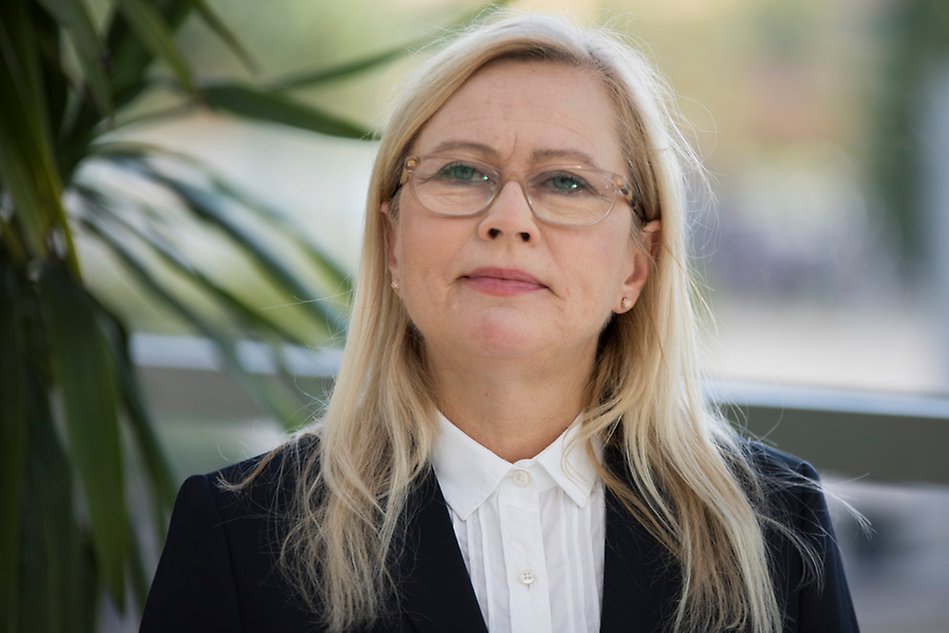Professor’s portrait: The nurse who became a professor
In most cases, when someone becomes ill, it affects more than one person, extending to the people around them. Close relatives were a neglected group in healthcare for a long time. Kristina Ziegert has made it her calling to put their needs and life situation on the agenda.
“In actual fact, all healthcare takes place in private life. You are only at the hospital for a very short time. There, you get support for the most acute needs, but then you are left to yourself and the family.”
Kristina Ziegert
“The choice of research subject stemmed from an encounter with a patient. I had actually intended to research patients with kidney failure. A patient had just started on blood dialysis and felt quite well. However, his wife was very despondent because he had changed so much – she hardly recognised him.”
Kristina Ziegert had by this stage worked as a nurse at the hospital in Halmstad for many years and felt confident as a professional. However, the encounter with the dialysis patient and his relatives led her to discover important knowledge gaps – about the patient as a person, and about what the relatives saw, but she did not.
“In actual fact, all healthcare takes place in private life. You are only at the hospital for a very short time. There, you get support for the most acute needs, but then you are left to yourself and the family.”

Focus on carer support in healthcare
That was how Kristina Ziegert switched focus and started to research the life situation of close relatives. Her thesis was one of the first to highlight the importance of support for family carers in healthcare. Since then, she has taken part in several action research projects with relatives, lectured at family carers associations and been interviewed in newspapers.
Kristina Ziegert’s research primarily concerns developing support for relatives, family-focused nursing and future decision-making in nursing.
“By drawing attention to family carers’ everyday lives, their strength and enormous contribution to patients’ health, I believe my research has helped to improve communication and cooperation between healthcare and family carers. There has been an increase in knowledge about their health as well as the support they receive.”
The life situation of family carers must be seen in a larger societal perspective, considers Kristina Ziegert.

“Health from a long-term perspective”
“Today, there are very few within the family who can help a person who is ill. Nowadays, for example, most women work away from home. The structure of society means that we must get better at asking each other for help within the family, dare to inconvenience, and look at who is responsible for health.”
Independent approach paved the way
Kristina Ziegert believes her driving force to create change was sparked when she trained to become a nurse in the mid-1980s.
“The training programme was based on students taking responsibility. We pursued knowledge, planned, took personal responsibility for our studies and read a huge amount of literature. I think that independent approach to education laid the foundations for my continued professional life.”
After graduating as a nurse, Kristina Ziegert worked at a newly started department for patients with medical and surgical diseases at the hospital in Halmstad. She soon began to specialise in the development of nursing documentation and nursing processes, while also studying nursing science at the Master’s level – a subject that Halmstad University was the first to offer in Sweden. Eventually, Kristina Ziegert left the hospital to devote herself to full-time research.
New focus: health in the later stages of life
In recent years, Kristina Ziegert has focused on health in the later stages of life and tried to find new ways to make better assessments of patients’ health. Among other things, she has worked on a project concerning the health of older people in the workplace and health promotion for active pensioners.
“Now I am also trying to find connections with children, their view of physical activity and how they can cooperate with active pensioners. This concerns health from a long-term perspective. In the spring, we will conduct an experiment in which a group of women active at the fitness centre, Friskis & Svettis, will be dancing together with children in the six-to-eight age group.”
Kristina Ziegert foresees a bright future for the nursing profession. More nurses are taking up executive positions and are involved in driving the development of tomorrow’s healthcare.
“The education we offer in Halmstad is of high quality. We want to raise clinical expertise and continue to create good conditions for nurses – the nursing managers of the future. An awareness of knowledge-based nursing can make a difference.”
Text: Hanna Grosshög
Translation: Communications, Lund University
Picture: Dan Bergmark, iStock
Kristina Ziegert was born in 1957 in Gdansk, Poland, and has lived in Halmstad since 1976. She studied in Halmstad to become a nurse and graduated in 1988. She subsequently worked in medicine and surgery at the hospital in Halmstad in parallel with further studies including nursing science. She gained a PhD in 2005 from Linköping University for the thesis “Everyday life among Next of Kin of Haemodialysis Patients”. In 2012, she became an associate professor and on 1 January 2017 she was appointed Professor of Nursing.

